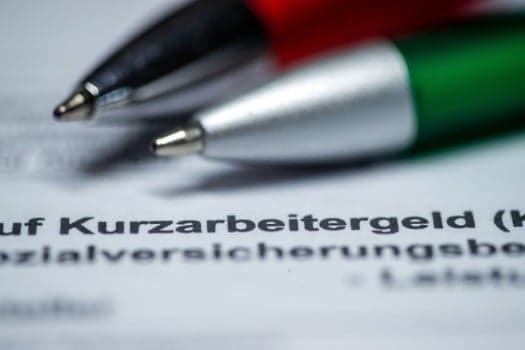Kurzarbeit: Everything you need to know about paying taxes on reduced working hours

Like most bureaucratic aspects of life in Germany, paying taxes on reduced working hours is a bit complicated. We break down how you can save money.
What is Kurzarbeit'?
Kurzarbeit, directly translated as ‘short work', is far from a new idea in Germany – it became fully established in 1924 as a response to the economic crisis of the Weimar Republic. But it has risen to a new level of prominence during the Covid-19 pandemic.
Essentially, in order to deal with rising unemployment, company employees are put on reduced hours.
The federal government then steps in to pay around 60 percent of their salary for a set period of time – normally a year.
This payment is known as ‘Kurzarbeitergeld' (short-time worker payment) and is paid directly into your bank account.
In 2020, 16 percent of the German workforce were on ‘Kurzarbeit' as a result of the pandemic – that's around 7.3 million people.
READ ALSO: EXPLAINED: What you need to know about Germany's 'Kurzarbeit' job support scheme?
Will I have to pay tax on the Kurzarbeit money I receive?
Anyone who receives a Kurzarbeit allowance is required to file a tax return. The allowance itself, though, is paid tax-free.
This means that it is lower than the gross salary, but because taxes and social security contributions are no longer deducted, the difference to the usual net salary is not that great.
However, the Kurzbeit allowance is also subject to a Progressionsvorbehalt, or progression clause. If it sounds complicated, that’s because it is.
Jana Bauer from the Federal Association of Wage Tax Assistance Associations, explained it this way to Spiegel:
"When you file your tax return for the previous year, the first thing that is determined is how high your taxable income is and the tax to be assessed on it."
In Germany, there is a tax progression, which means that those who earn more also get a higher percentage deducted from their income as tax - at least within a certain range.
"To determine the tax rate, not only the total income is considered, i.e. not only the taxable portion from gross wages, for example, but also wage replacement benefits, such as unemployment benefits, parental benefits or maternity benefits," Bauer said.
In other words, these benefits by themselves are tax-free but factored into the overall tax class.
And so Kurzarbeit allowance, which is a classic wage replacement benefit, also has an effect on the tax progression.

Photo: DPA
This can play a role, for example, if you receive your salary for half a month and Kurzarbeit allowance for the other two weeks. As the salary is only half as high for half the month, a much lower tax is deducted directly from the salary in the monthly payroll.
How Kurzarbeit affects the tax rate
However, the Kurzarbeit allowance you receive for the second half of the month raises the tax rate. Then, because of the higher rate, you have to pay money in arrears when you file your tax return.
This is also the reason why a person is obliged to file a tax return as a recipient of a Kurzarbeit allowance. Single employees who are taxed in tax class 1 are not actually required to file a return. In years with a short-time allowance of more than €410, however, they are.
READ ALSO: Why people on 'Kurzarbeit' in Germany need to prepare for a tax surprise
"In practice, most recipients of a Kurzarbeit allowance should be spared an additional payment if they were exclusively on the allowance for a few months and worked full time in other months," said Bauer.
It is not possible to rule it out across the board, because so many factors play a role in the tax return, such as what is deducted as income-related expenses, household-related expenses or special expenses.
"But more common will be set-ups in which you still get a refund after the tax return."
A simple example with round figures illustrates this and shows what difference the type of Kurzarbeit work on its own makes:
A single person without children with tax class I and a gross salary of €2,000 is on 100 percent reduced working hours for six months this year, and is working full-time for the remaining months.
The employee can expect a refund of around €600 after filing his tax return.
This is because with a gross wage of €2,000 over half a year, he would have to pay more than €1,100 in income tax, because the calculation assumes a constant wage for the entire year. If the employee had only 50 percent short-time work, but this over the entire year, on the other hand, he would have to pay around €600 in back taxes.
The reason for this is that if the wage is €1,000, i.e. "half" wage, he pays no wage tax at all.
On the website of the Federal Ministry of Finance, there is a calculator that anyone can use to determine the individual effect of the tax class on their monthly salary.
Comments
See Also
What is Kurzarbeit'?
Kurzarbeit, directly translated as ‘short work', is far from a new idea in Germany – it became fully established in 1924 as a response to the economic crisis of the Weimar Republic. But it has risen to a new level of prominence during the Covid-19 pandemic.
Essentially, in order to deal with rising unemployment, company employees are put on reduced hours.
The federal government then steps in to pay around 60 percent of their salary for a set period of time – normally a year.
This payment is known as ‘Kurzarbeitergeld' (short-time worker payment) and is paid directly into your bank account.
In 2020, 16 percent of the German workforce were on ‘Kurzarbeit' as a result of the pandemic – that's around 7.3 million people.
READ ALSO: EXPLAINED: What you need to know about Germany's 'Kurzarbeit' job support scheme?
Will I have to pay tax on the Kurzarbeit money I receive?
Anyone who receives a Kurzarbeit allowance is required to file a tax return. The allowance itself, though, is paid tax-free.
This means that it is lower than the gross salary, but because taxes and social security contributions are no longer deducted, the difference to the usual net salary is not that great.
However, the Kurzbeit allowance is also subject to a Progressionsvorbehalt, or progression clause. If it sounds complicated, that’s because it is.
Jana Bauer from the Federal Association of Wage Tax Assistance Associations, explained it this way to Spiegel:
"When you file your tax return for the previous year, the first thing that is determined is how high your taxable income is and the tax to be assessed on it."
In Germany, there is a tax progression, which means that those who earn more also get a higher percentage deducted from their income as tax - at least within a certain range.
"To determine the tax rate, not only the total income is considered, i.e. not only the taxable portion from gross wages, for example, but also wage replacement benefits, such as unemployment benefits, parental benefits or maternity benefits," Bauer said.
In other words, these benefits by themselves are tax-free but factored into the overall tax class.
And so Kurzarbeit allowance, which is a classic wage replacement benefit, also has an effect on the tax progression.

Photo: DPA
This can play a role, for example, if you receive your salary for half a month and Kurzarbeit allowance for the other two weeks. As the salary is only half as high for half the month, a much lower tax is deducted directly from the salary in the monthly payroll.
How Kurzarbeit affects the tax rate
However, the Kurzarbeit allowance you receive for the second half of the month raises the tax rate. Then, because of the higher rate, you have to pay money in arrears when you file your tax return.
This is also the reason why a person is obliged to file a tax return as a recipient of a Kurzarbeit allowance. Single employees who are taxed in tax class 1 are not actually required to file a return. In years with a short-time allowance of more than €410, however, they are.
READ ALSO: Why people on 'Kurzarbeit' in Germany need to prepare for a tax surprise
"In practice, most recipients of a Kurzarbeit allowance should be spared an additional payment if they were exclusively on the allowance for a few months and worked full time in other months," said Bauer.
It is not possible to rule it out across the board, because so many factors play a role in the tax return, such as what is deducted as income-related expenses, household-related expenses or special expenses.
"But more common will be set-ups in which you still get a refund after the tax return."
A simple example with round figures illustrates this and shows what difference the type of Kurzarbeit work on its own makes:
A single person without children with tax class I and a gross salary of €2,000 is on 100 percent reduced working hours for six months this year, and is working full-time for the remaining months.
The employee can expect a refund of around €600 after filing his tax return.
This is because with a gross wage of €2,000 over half a year, he would have to pay more than €1,100 in income tax, because the calculation assumes a constant wage for the entire year. If the employee had only 50 percent short-time work, but this over the entire year, on the other hand, he would have to pay around €600 in back taxes.
The reason for this is that if the wage is €1,000, i.e. "half" wage, he pays no wage tax at all.
On the website of the Federal Ministry of Finance, there is a calculator that anyone can use to determine the individual effect of the tax class on their monthly salary.
Join the conversation in our comments section below. Share your own views and experience and if you have a question or suggestion for our journalists then email us at [email protected].
Please keep comments civil, constructive and on topic – and make sure to read our terms of use before getting involved.
Please log in here to leave a comment.